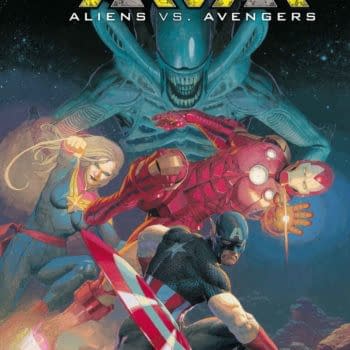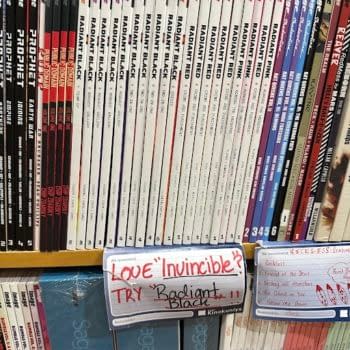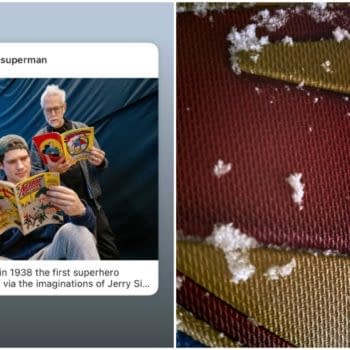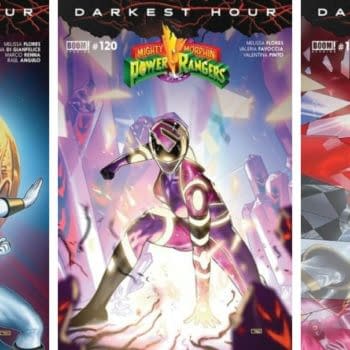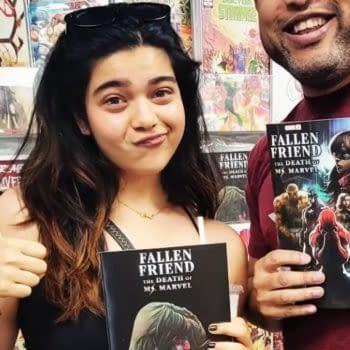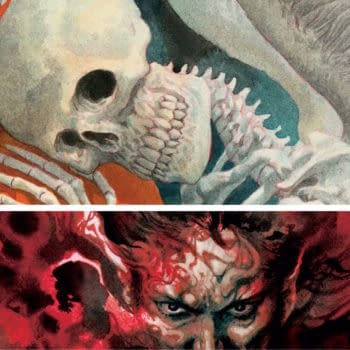Posted in: Comics | Tagged:
Representation Matters! How To Respectfully Write And Draw POC And LGBTQIA Characters At NYCC
Joe Glass writes:
On a busy Thursday at New York Comic Con, surprisingly busy for the first day, we have the first panel on diversity coming shortly after the heated exchanges between retailers and Marvel editors at the Retailers Breakfast. The panel consists of Tee Franklin, Steve Foxe, Regine Sawyer and Kwanza Osajyefo.
Franklin talks about Bingo Love, describing the plot and general idea of the plot, of two women who can't come out when they first meet, but find each other again much later in life, and find their true love again.
Franklin talks the visual representation of showing characters who are older, who have stretch marks or are generally larger builds, and characters of color with darker complexions too. She talks about how it was important to show this visually, and seems to be desired by fans, and even made it something she tested from the start with artists to make sure they understood how black skin reacts and looks differently in different qualities of light.
Franklin then briefly discusses her new horror book, Jook Joint, which she says will be a very triggering book, and will include ideas like 'if you had the opportunity to have the person who assaulted you killed and it wouldn't come back on you, would you do it?'
Foxe is up next to talk about his contribution for Love is Love. He talks about how a lot of his viewpoints in terms of diversity and representation in comics comes from working as an editor and seeing the attempts from the other side. He discusses how while there may be a few different stories of LGBTQ characters, they aren't very diverse. They aren't the fun Sci-Fi, or a horror or more, it's often the abusive coming out story, or the coming to terms with your sexuality story.
Asked how would he suggest non-LGBTQIA members of the audience may introduce such characters in their book without being a stereotypical, but Foxe answered that first he'd say there's nothing wrong with a stereotypical 'Glee-loving' queer character. He discusses how as an editor at Random House, he knew that writers who were not part of those minorities felt unable to write them as they 'need a permission slip' or felt defensive if someone tries to point out improvements to them. And his answer to them is you need to have empathy, to learn from the people around you and to be accepting of feedback.
Osajyefo talks about the dearth of black characters in superhero comics, and how he realized that came from often the lack of black representation in the industry. He points out that of course there are some, but often they are not there at the same time, making it seem like there's very few at a given time.
He got the idea for Black, but then never did anything with it for ten years, but then went ahead and made the book now that Kickstarter became an option, and they raised an out of this world amount of money.
He discusses how the premise, where only black people have superpowers in a world that already fears and hates them, and Osajyefo talked about how the premise came from real life. You see it in your feed every day, and for a black person, they can't take their mask off like Tony Stark and be like 'I'm just a billionaire', people will just think 'you're still black'.
Asked a similar question to earlier, but in regards to making black characters, Osajyefo reiterates that research is important. Talk to people who might relate to the experiences you're trying to write, see if you can get someone part of the community to read it. He says it's your job as a creative, do your work, do your research. And listening to feedback is important too.
Franklin reiterates listening to feedback is again important, and not bouncing back that they 'don't understand' is no good. 'Don't give that person static because you don't like their answer.' Osajyefo says get multiple opinions, if there's a statistical confluence, then you may need to make some changes.
Foxe talked about at Random House and at a time when Sensitivity Readers became more popular, how one person can't give that the 'black' or 'gay' stamp of approval. He joked, however, how he'd love to have that 'Gay stamp of approval'.
Sawyer talks about putting together Women in Comics, which culminated in creating Women in Comics Con, and how that continues to grow. She talked about how members just want to connect and want to find other women who work in the industry, as they didn't feel like they had a community.
Advice for women in comics? Sawyer says about asking when did you first realize you were a woman in the industry, which she points out sounds odd, but talked about how you work on your work and then when you finally see another woman in the industry you get a feeling of 'Oh my god, a woman!', and she said you work in your work and you remember who you are.
How do you encourage women to get their work out there? Sawyer says nowadays maybe start with webcomics. She started in print and it is so costly. But she says above everything, just draw, just create. If you think no one wants to read it, someone will. Franklin also said look to anthologies, and how you can look at that to be your first comics work. It helps as well to start small, short, complete full stories, and guess what, after that you are a published creator.
A fan question talked about a creator who she feels has taken all this advice, in Sophie Campbell, and how she creates books with diverse ethnicities and body types respectfully. The panellists praise her for doing this for years before it became a much more discussed topic in the industry, particularly praises Wet Moon.
Tee Franklin in answer to a question announced again that Image Comics picked up Bingo Love, which drew applause, and that it is available at the C1 table at Artists Alley.
Fan asking about neuro-atypical representation, and mentioned a prose novel that followed such a character, and wondered how do you bring that kind of sensitivity to your main characters in comics? Osajyefo said how he immediately thought as the fan asked the question about what you could do with the panels to illustrate that different way of thinking and relating to the world, and how that is the wonderful thing about the medium.
How do you see representation in characters who don't have a visually different difference (i.e. A gay character – like Dumbledore in Harry Potter) when it isn't something that comes up as a part of the story? Foxe agrees how learning Dumbledore was gay after the fact did feel it made the character more awesome, but he gets it. He mentions Steve Orlando doing it well, but how it is awkward to have that scene come up so it's obvious within context that they are queer.
A fan asked about creating a Kickstarter, whether they do it on their own or use professional services? Osajyefo said how he did it all himself, but yes it meant having to do a lot of research, considering card charges, postage costs etc. Franklin talked about how actually going so incredibly successful with the project in itself can raise challenges, as awesome as it may sound having all the extra budget, there's all the logistical elements suddenly become an issue. She recommends working everything out, and maybe even having preparations for a 'just in cases it blows up'. She talks about fulfillment centers now being a thing. She recommends KS campaigns are better to do early, rather than later in the year.
How does an independent writer find a sensitivity reader? Franklin says simply: twitter. But make sure you pay them, and don't give them pain for the recommendations.
How do you separate out personal experiences from the larger social experiences? Osajyefo said it was part of having a large cast of black characters in Black, to represent all the different ideas of what being black is to different people. Making more of those characters helps to create more diversity and range of representation too.













